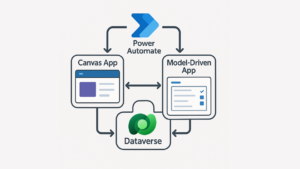Dataverse vs SQL Server: What’s the Difference?
Choosing the appropriate storage solution is an important choice for any business, now more than ever, where everything is digital. IT leaders working within the Microsoft ecosystem often find themselves weighing two key options: Microsoft Dataverse vs SQL Server. While both platforms offer powerful data management capabilities, they serve different purposes and cater to different business needs.
For organizations building enterprise applications, analytics pipelines, or using Azure software development tools for cloud-based solutions, selecting the right data platform can have a huge impact on scalability, security, integration, and cost efficiency. A wrong choice could lead to performance issues, compliance challenges, or unexpected costs.
We will take a closer look at the key differences, strengths, and limitations of Microsoft Dataverse and SQL Server, helping your teams make better choices for your business. We’ll also explore common challenges, scalability considerations, security features, data governance capabilities, and cost implications that will help you pick the right tool for your business.
What Are Dataverse and SQL Server?
IT teams in the Microsoft ecosystem must choose between Microsoft Dataverse and SQL Server for data storage, management, and security. Understanding their differences helps IT leaders build, scale, and maintain applications effectively.
Microsoft Dataverse: A Modern, Cloud-Based Data Platform
Microsoft Dataverse is a cloud-native, fully managed data platform designed for business applications within Microsoft Power Platform, Dynamics 365, and Microsoft 365. It simplifies data storage, management, security, and integration, enabling low-code and no-code development.
With a structured approach using tables, relationships, and business logic, it helps teams build apps, automate workflows, and connect Microsoft services. While ideal for process automation and business applications, it’s unsuitable for complex transactional processing or advanced database tuning.
SQL Server: A Powerful, Traditional Relational Database
SQL Server is a strong, enterprise-grade Relational Database Management System (RDBMS) offering deep customization, high-performance processing, and advanced querying for transactional systems, analytics, and mission-critical applications. However, it requires active management, database expertise, and ongoing maintenance, especially for on-premises or self-hosted deployments.
The choice between Dataverse and SQL Server depends on business needs, technical expertise, and scalability requirements.
- Cloud-Native vs. Traditional RDBMS: Dataverse is fully managed and cloud-native, whereas SQL Server follows a traditional RDBMS approach that can be deployed on-premises, hybrid, or in the cloud.
- Low-Code vs. Deep Customization: Dataverse is designed for rapid development using Power Apps and low-code tools, whereas SQL Server allows advanced customization and database engineering for complex applications.
- Managed vs. Self-Hosted: Dataverse is a managed service, so Microsoft handles maintenance, updates, and security. While available in managed cloud versions (like Azure SQL), SQL Server is often self-hosted, requiring hands-on database administration.
Key Differences Between Dataverse vs SQL Server
Deployment and Architecture
Microsoft Dataverse is a cloud-native, fully managed data platform that seamlessly integrates with Microsoft technologies. It eliminates the need for server provisioning, infrastructure maintenance, and database tuning, making deployment faster and with fewer issues. It is also ideal for low-code applications and business automation.
SQL Server, in contrast, is a traditional RDBMS supporting on-premises, cloud (Azure SQL), and hybrid deployments. It offers full control over database architecture, storage, and performance tuning, making it better suited for high-performance applications and complex configurations. However, this flexibility requires active management, security updates, and scaling strategies, whereas Dataverse prioritizes automation and ease of use.
Scalability and Performance
Dataverse is designed for business applications, automation, and cloud-based scalability, making it suitable for moderate data workloads and structured data relationships. However, it lacks deep performance tuning options and struggles with high-volume transactional processing.
SQL Server, on the other hand, excels in handling large datasets, complex queries, and high-performance workloads, thanks to its indexing, partitioning, and optimization capabilities. While Dataverse offers auto-scaling and managed resources, SQL Server requires careful resource planning but delivers superior performance for data-intensive applications.
Security and Compliance
Both platforms offer enterprise-grade security, but their approaches differ. Dataverse automates security management, enforcing role-based access, field-level security, and encryption within Microsoft’s compliance framework (GDPR, HIPAA, etc.), making it easier to manage. SQL Server provides more granular control over security policies, including database encryption, custom access controls, and network configurations, making it a better choice for organizations with strict internal compliance needs.
However, managing SQL Server security (especially in self-hosted or on-premises setups) requires continuous monitoring, patching, and policy enforcement, whereas Dataverse offloads these responsibilities to Microsoft.
Integration and Capabilities
Dataverse is deeply integrated with Power Apps, Power Automate, Dynamics 365, and Microsoft 365, making it the best choice for organizations that rely on Microsoft’s ecosystem for low-code app development and workflow automation. It provides pre-built connectors and APIs for easy data exchange, simplifying integration without extensive coding.
SQL Server, on the other hand, is designed for custom applications, enterprise systems, and third-party integrations. It supports advanced ETL (Extract, Transform, Load) processes, complex queries, and business intelligence tools like Power BI, making it ideal for data warehouses, analytics, and large-scale enterprise applications. Unlike Dataverse, SQL Server requires manual integration efforts but offers greater flexibility for connecting to various systems.
Data Storage and Structure
Dataverse organizes data into tables with relationships, business rules, and security layers, making it ideal for structured business applications. It provides predefined schema options, role-based access, and simplified data modeling, reducing the need for database expertise. However, it is not designed to handle massive datasets or high-performance transactions.
SQL Server stores data in a highly optimized relational structure, supporting complex joins, indexing, partitioning, and transactional integrity. It excels in handling large datasets, high-speed queries, and complex relationships, making it a better fit for data-intensive applications, reporting, and analytics. Unlike Dataverse, SQL Server allows full control over schema design and performance optimization.
Customization and Development Flexibility
Dataverse is built for low-code and no-code development, enabling users to create applications and workflows with minimal programming. It limits deep customization but simplifies development by offering prebuilt tables, business logic, and tools to automate business processes within the Power Platform.
SQL Server provides complete flexibility, allowing developers to use custom queries, stored procedures, and database triggers to improve performance and personalize applications according to business needs. It supports multiple programming languages, extensive customization, and third-party integrations, making it the preferred choice for organizations that require complex data processing and solutions suited for their needs.
Cost Considerations
Dataverse follows a subscription-based pricing model, where costs are determined by storage, API requests, and the number of users. It reduces infrastructure and maintenance costs since Microsoft manages everything, but expenses can scale up based on data volume and usage.
SQL Server costs vary depending on the licensing model, deployment type, and infrastructure requirements. On-premises installations require hardware, licensing, and ongoing maintenance costs, while Azure SQL offers managed options with pay-as-you-go pricing. While SQL Server offers greater control and scalability, it often requires higher upfront investment and dedicated database management resources.
When to Choose Dataverse vs SQL Server
Dataverse is ideal for organizations using Power Apps, Dynamics 365, or Microsoft 365 that need a low-code, managed data platform. It simplifies app development, automation, and integration without requiring database expertise, making it a great fit for small to mid-sized businesses or internal teams. With built-in security and automatic scaling, it’s best for structured business applications but lacks deep customization and high-performance processing, making it less suitable for data-intensive workloads.
SQL Server is better for organizations needing full control over database architecture, advanced querying, and high-performance processing. It supports large datasets, transactional systems, and custom applications, making it ideal for enterprises, financial institutions, and data-driven industries. While it offers greater flexibility and performance tuning, it requires database management expertise and infrastructure oversight, which may not be practical for those seeking a fully managed solution.
Why a Hybrid Strategy with Dataverse and SQL Server Might Be the Best Fit
In many cases, businesses don’t have to choose between Dataverse or SQL Server, they can get the best of both. A hybrid strategy lets organizations take advantage of Dataverse’s low-code agility and seamless integration with Power Platform, while still leveraging SQL Server’s raw power, performance tuning, and enterprise-scale capabilities.
For example:
- Use Dataverse to manage data for internal applications built with Power Apps, supporting rapid development and automation.
- Use SQL Server to handle large-scale analytics, complex transactions, or external-facing systems that demand high performance and custom architecture.
- Sync data between the two platforms using Power Automate, Azure Data Factory, or custom APIs, enabling real-time reporting and unified workflows across business units.
This hybrid approach balances flexibility with control—making it easier to innovate without sacrificing performance, compliance, or scale.
Avoid These Common Mistakes When Choosing Between Dataverse and SQL Server
Selecting the wrong data platform can lead to serious long-term challenges ranging from performance bottlenecks to unexpected costs or rework. Here are some of the most common mistakes organizations make when choosing between Dataverse and SQL Server:
- Choosing Based on Familiarity, Not Fit
Many teams default to SQL Server simply because they’ve used it before without evaluating whether their current needs could be better served by a low-code platform like Dataverse. - Underestimating Future Scalability Needs
Some choose Dataverse for speed, only to realize later it can’t handle their growing volume of complex data processing. Planning for scale from the beginning is critical. - Overengineering Simple Use Cases
Using SQL Server for basic internal apps or workflow automation can add unnecessary complexity and overhead when Dataverse would have delivered faster results with less effort. - Ignoring Integration Requirements
Not all data platforms integrate equally well with existing tools and workflows. Failing to consider Power Platform, Dynamics 365, or external systems can create friction down the road. - Overlooking Governance and Compliance
Both platforms support strong security, but the implementation differs. Choosing without aligning to your org’s compliance policies can create audit gaps or maintenance burdens.
How i3solutions Helps You Implement the Right Data Strategy
As a top Microsoft System Integrator, i3solutions has deep expertise in both Microsoft Dataverse and SQL Server, helping organizations choose the right platform based on their business needs, scalability goals, and technical requirements. Many businesses struggle with deciding between a low-code managed platform like Dataverse vs SQL server with a fully customizable RDBMS. Our team ensures that Dataverse implementations are optimized for security, scalability, and seamless integration with Power Platform so businesses can build applications efficiently without worrying about infrastructure or performance limitations.
For SQL Server, we design and implement high-performance, secure, and cost-efficient database architectures across on-premises, cloud, and hybrid environments. SQL Server offers full control over data management, performance tuning, and advanced analytics, but without proper expertise, businesses may face bottlenecks, security risks, and high maintenance costs. We also help organizations connect Dataverse and SQL Server for hybrid data strategies, ensuring smooth data flow, governance, and compliance. This is essential for businesses needing both low-code agility and enterprise-grade data control.
Choosing a partner with expertise in both Dataverse and SQL Server is crucial because many organizations operate in mixed environments that require smooth and easy data integration, performance optimization, and security best practices. With real-world experience supporting mid to large enterprises, i3solutions architects Microsoft-based data solutions that balance agility with enterprise-scale demands, helping businesses make the most of their data strategy while avoiding costly missteps.
Dataverse vs. SQL Server: The Right Choice, The Right Strategy with i3solutions
Dataverse vs SQL Server serve distinct yet complementary roles within the Microsoft ecosystem. Dataverse excels in low-code development, app integration, and rapid deployment, making it perfect for Power Apps and business automation. SQL Server, on the other hand, is built for high-performance processing, advanced queries, and deep customization, powering enterprise applications, analytics, and transactional workloads.
For many organizations, a hybrid approach offers the best of both worlds: Dataverse for application data and workflow automation and SQL Server for analytics, reporting, and complex data operations. But selecting the right platform isn’t just about features; it’s about aligning with your long-term IT strategy to ensure scalability, security, and cost efficiency as your business grows.
That’s where i3solutions comes in. With deep expertise in both Dataverse and SQL Server, we help you make the right decision, implement the best solution, and future-proof your data strategy. If you need low-code agility, enterprise-grade performance, or a seamless hybrid model, i3solutions is here to guide you every step of the way. Contact us now, and let’s create a Digital Transformation roadmap that works for everyone, ensuring your data strategy is secure, scalable, and built for the future.






